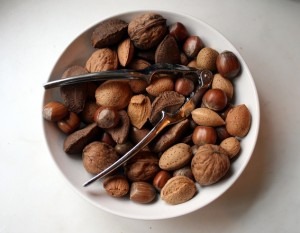Cracking the Cancer Code: How Selenium Fights Cancer
October 2, 2015 | Author: Dr. Véronique Desaulniers
A study conducted through the University of Copenhagen, Demark has made an exciting discovery about the healing power of selenium. It has long been known that this trace mineral is beneficial for regulating the immune system and thyroid function, amongst other things. In a report published last year in the
In a report published last year in the Journal of Biological Chemistry, researchers also discovered specific evidence pointing to its unique effect on cancer tumor growth.
What Selenium Does to Cancer
“We have now shown that certain selenium compounds, which are naturally found in [for example] garlic and broccoli, effectively block the special immune-stimulatory molecule that plays a serious role for aggressive cancers such as melanoma, prostate cancer and certain types of leukaemia,” says study head researcher Professor Søren Skov of the Department of Veterinary Disease Biology at the University of Copenhagen.
The Copenhagen study focused on selenium’s effect on NGK2D ligands, compounds that cancer cells use to first ramp up and then disarm immune system cells. This compound can take the form of a liquid and lead to “molecular dissolution.” When this happens, the entire bloodstream can be affected and serious complications can ensue. The exciting news about the Swedish study is that researchers found that selenium has the ability to neutralize the NGK2D ligand whether it is in liquid form or not.
Earlier studies which look at selenium’s cancer-fighting properties when it comes to breast cancer abound. A 2012 study conducted on rats at El Fayoum University in Egypt showed that when selenium was combined with the soy isoflavone genistein, it “provided antioxidant defense with high-potential chemo-preventative activity” against cancerous breast tumors. Other studies have proven that selenium can act as a natural aromatase inhibitor and can also ramp up the response of Natural Killer cells in the body.
Selenium has been shown to work in conjunction with the drug Tamoxifen to inhibit breast cancer growth (as seen in mice) and has been proven to help prevent the recurrence of cancer by affecting stem cells. One study conducted by the Centre for Research in Women’s Health in Ontario, Canada, even linked selenium intake with the normalization of chromosome breaks, thus affecting BRCA1 gene mutations.
Selenium: A Little Goes a Long Way
As a trace mineral, selenium is found in water and soil. Besides supplementation, it can also be obtained in dozens of natural, whole foods. Brazil nuts are reported to have the highest selenium content. Other sources of selenium include:
- Beans and seeds, such as lima, pinto, chia, sunflower, flax and sesame;
- Certain meats and meat products including organic chicken, eggs, boneless turkey, grass-fed beef and beef liver;
- Cruciferous and green-leafy vegetables such as spinach, cabbage, broccoli and wheat grass;
- Members of the fungi family like shiitake and white button mushrooms;
- Some fish, including cod, sardines, halibut and yellowfin tuna.
Selenium comes as selenomethionine, selenocysteine and methyl selenocysteine, which are organic compounds, and also as inorganic (selenite) mineral compounds. Selenium in its inorganic state can be toxic. To take advantage of its health benefits, I recommend the organic forms since they have a better absorption rate and are more effective in general.
It doesn’t take much of this kind of the mineral to have an effect. Research has shown that as little as 200 mcg a day may be the optimal amount to produce anti-cancer effects in your body. Keep in mind too that selenium is measured not in milligrams (mg), but in micrograms (mcg). It is possible to take too much of it, which, although rare, can result in GI tract upset, nerve damage, brain fog, fatigue and a condition called selenosis.
In laboratory studies, selenium has been proven time and again to be a powerful tool to have at your disposal when it comes to breast cancer prevention and should be a consideration for any healthy breast lifestyle plan. Whenever possible, it is always best to get your selenium from the whole, organic foods you eat. If supplementation is needed, err on the conservative side. Remember, a little goes a long way when it comes to this potent cancer-fighter.
Editor’s Note: We agree. It is always preferable to get minerals like selenium from whole foods, which help avoid possible toxicity, offer better bioavailability, and provide all of the essential synergists necessary for efficient utilization.
Join the conversation: Ask Holistic Cancer Coach Facebook Group
 Dr. Veronique Desaulniers (“Dr. V”) is a best-selling author and founder of breastcancerconqueror.com. She specializes in Chiropractic, Bio-Energetics, Meridian Stress Analysis, Homeopathy and Digital Thermography. After 30 years in active practice, she decided to “retire” and devote her time to sharing her personal, non-toxic Breast Cancer healing journey with others. Her years of experience and research have culminated in “The 7 Essentials™ “, a step-by-step coaching program that unravels the mystery of healing the body. Her website and personal healing journey have touched the lives of thousands of women around the globe.
Dr. Veronique Desaulniers (“Dr. V”) is a best-selling author and founder of breastcancerconqueror.com. She specializes in Chiropractic, Bio-Energetics, Meridian Stress Analysis, Homeopathy and Digital Thermography. After 30 years in active practice, she decided to “retire” and devote her time to sharing her personal, non-toxic Breast Cancer healing journey with others. Her years of experience and research have culminated in “The 7 Essentials™ “, a step-by-step coaching program that unravels the mystery of healing the body. Her website and personal healing journey have touched the lives of thousands of women around the globe.
References:
[1] http://healthsciences.ku.dk/news/news2014/selenium-compounds-boost-immune-system-to-fight-against-cancer/
[2] http://www.jbc.org/content/289/45/31576.abstract?sid=d6175d74-d4ed-497a-83c1-69830dc85da0
[3] http://www.ncbi.nlm.nih.gov/pubmed/22128327
[4] http://www.ncbi.nlm.nih.gov/pubmed/15894690
[5] http://www.ncbi.nlm.nih.gov/pubmed/18855134
[6] http://www.ncbi.nlm.nih.gov/pubmed/22089659
[7] http://abcnews.go.com/blogs/health/2012/02/28/selenium-supplements-too-much-of-a-good-thing/
